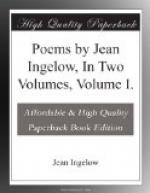“She rose amazed, but cursed me too;
She could not hold such luck for true,
But gave him soon, with small ado.
I laid him by my Lucy’s side:
Close to her face that baby crept,
And stroked it, and the sweet soul wept;
Then, while upon her arm he slept,
She passed, for she was satisfied.
“I loved her well, I wept her sore,
And when her funeral left my door
I thought that I should never more
Feel any pleasure near me glow;
But I have learned, though this I had,
’Tis sometimes natural to be glad,
And no man can be always sad
Unless he wills to have it so.
“Oh, I had heavy nights at first,
And daily wakening was the worst:
For then my grief arose, and burst
Like something fresh upon my head;
Yet when less keen it seemed to grow,
I was not pleased—I wished to go
Mourning adown this vale of woe,
For all my life uncomforted.
“I grudged myself the lightsome air,
That makes man cheerful unaware;
When comfort came, I did not care
To take it in, to feel it stir:
And yet God took with me his plan,
And now for my appointed span
I think I am a happier man
For having wed and wept for her.
“Because no natural tie remains,
On this small thing I spend my gains;
God makes me love him for my pains,
And binds me so to wholesome care
I would not lose from my past life
That happy year, that happy wife!
Yet now I wage no useless strife
With feelings blithe and debonair.
“I have the courage to be gay,
Although she lieth lapped away
Under the daisies, for I say,
‘Thou wouldst be glad if thou couldst
see’:
My constant thought makes manifest
I have not what I love the best,
But I must thank God for the rest
While I hold heaven a verity.”
He rose, upon his shoulder set
The child, and while with vague regret
We parted, pleased that we had met,
My heart did with herself confer;
With wholesome shame she did repent
Her reasonings idly eloquent,
And said, “I might be more content:
But God go with the carpenter.”
THE STAR’S MONUMENT.
IN THE CONCLUDING PART OF A DISCOURSE ON FAME.
(He thinks.)
If there be memory in the world to come,
If thought recur to SOME THINGS silenced
here,
Then shall the deep heart be no longer dumb,
But find expression in that happier sphere;
It shall not be denied their utmost sum
Of love, to speak without or fault or
fear,
But utter to the harp with changes sweet
Words that, forbidden still, then heaven were incomplete.
(He speaks.)
Now let us talk about the ancient days,
And things which happened long before
our birth:
It is a pity to lament that praise
Should be no shadow in the train of worth.
What is it, Madam, that your heart dismays?
Why murmur at the course of this vast
earth?
Think rather of the work than of the praise;
Come, we will talk about the ancient days.




